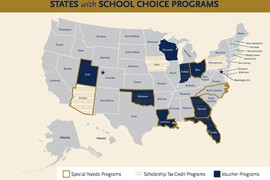Cronkite News has moved to a new home at cronkitenews.azpbs.org. Use this site to search archives from 2011 to May 2015. You can search the new site for current stories.
Separate reports praise Arizona for its school-choice programs
WASHINGTON_ Arizona earned high marks for its school-choice policies this week in separate reports from two national organizations, which had particular praise for the state’s education savings account program.
Alliance for School Choice called Arizona a national leader largely because of its “revolutionary” savings program, which awarded more than $1.5 million in scholarships to special education students in 2011.
“It gives the greatest amount of freedom for parents to the kids that need it most,” said alliance spokesman Malcom Glenn. “It’s a great trend and it’s something that’s really important.”
The savings account program was also cited by the American Legislative Exchange Council in a ranking of state school performance this week. Both organizations released their reports as part of National School Choice Week.
But the president of the Arizona Education Association criticized the program as little more than an opt-out method created for some students to avoid a dysfunctional system.
“States have an ethical responsibility to create – through the public education system – an excellent school for every student,” said Andrew Morrill, the teachers union president.
The union and other opponents, including the Arizona School Boards Association, sued the Arizona Department of Education in an effort to block the program, which allows public funds to be used as scholarships for students to attend private schools.
They argued that the scholarship program is too similar to a former state voucher program that was found unconstitutional by the Arizona Supreme Court in 2009. That program provided disabled students with state funds to attend private schools.
But a Maricopa County Superior Court judge on Wednesday rejected the suit, saying the “the monies are earmarked for a student’s educational needs as a parent may deem fit – not endorsed directly to a private institution in an all-or-nothing fashion.”
Morrill said he was disappointed with the ruling, but state education officials welcomed it.
“Arizona has long been a leader in adopting new school choice programs and promulgating them,” said Andrew LeFevre, spokesman for the Arizona Department of Education. “We’re making this about kids and parents and being able to find a good education.”
He said the department will continue to promote school-choice programs that allow decisions to be made at the most local level possible – by the parents – even though he expects more challenges.
“We don’t have any doubts that the other side will continue to challenge it,” LeFevre said, but he added that the state feels “very strongly that we’ve crafted a program” that can withstand constitutional challenge.
Arizona has three additional tax credit programs for low-income, disabled and foster care students to apply for state-funded scholarships to attend private school rather than public school.
Matthew Ladner, co-author of the American Legislative Exchange Council report, said Arizona has been committed to school-choice programs for more than a decade, but the newest program is proof of further innovation.
“This is the first school-choice program that is actually going to give parents a really powerful incentive to consider opportunity cost,” Ladner said.
The scholarship program gives eligible students 90 percent of the amount the state would spend to enroll them in public school. That number varies, but could reach $26,000, according to the Education Department’s website.
“Now we’re going to try to open up a full gamut of options to parents and let them pick,” said Ladner, a Phoenix resident. “This system is better situated to lead to innovation in schooling.”







